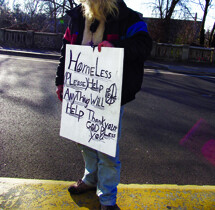
Church takes next step in ending homelessness
 BY MELISSA LAUBER
BY MELISSA LAUBER
UMCONNECTION STAFF
The aim of Baltimore-Washington Conference to end homelessness in this region drew closer to becoming a reality recently with a $1.5 million grant from the William S. Abell Foundation and $20,000 from the Enterprise Foundation.
These gifts to the conference's Be the Change ministry, to fund permanent supportive housing for the homeless in Washington, D.C., were announced Dec. 18 at Foundry UMC at a ceremony that also celebrated the new partnership between area United Methodists and Community Solutions, a national organization committed to the same cause.
While necessary, "a prayer is not a home and a prayer is not a solution," Bishop John Schol said at Foundry UMC in Washington. "It's up to God's people to create homes and provide solutions. Let's become a prayer together. We must be the prayer."
The scope of choosing to end rather than just manage homelessness takes United Methodists into a new, unchartered frontier where it is essential to lean on the expertise and resources that partnerships can provide, the bishop said.
At the Foundry event, the bishop introduced Rosanne Haggerty, the president of Community Solutions, whose mission is to strength communities to end homelessness. The national group is a spinoff of Common Ground, which ended street homelessness in the Times Square area of New York City.
The approach of Be the Change and Community Solutions recognizes the proven success of developing and operating permanent supportive housing and bringing a wide range of community stakeholders together to create and share cost-effective solutions that support a community's most vulnerable neighbors.
"We've proven time and time again that investing in effective housing strategies costs taxpayers far less than maintaining the status quo, where isolated, often sick people shuttle between the streets and shelters, hospitals and jails," Haggerty said.
Be the Change's first project in D.C. involves creating permanent housing, with access to services related to health, addiction, employment and a variety of other issues, at the repurposed Calvary UMC in the 1400 block of Columbia Road, NW, a Columbia Heights neighborhood in Washington, D.C.
Initial studies indicate that Calvary House will be able to provide 79 units of permanent supportive housing.
To assist in the funding of this and other projects to come, Tom Nurmi, of the William S. Abell Foundation, pledged $1.5 million to Be the Change.
In their work to end homelessness in the North Capital Street region, the Abell Foundation has three goals: to provide safe, dignified and affordable housing to the most vulnerable citizens, to align public and private resources to most effectively produce affordable housing and to create a national model to address the issue of homelessness.
"I'm confident that our goals and aspirations are aligned perfectly with Be the Change," Nurmi said. "When you make a commitment to this work it has to be for the long haul. If we stay focused, committed and passionate to this work, we will achieve great things."
David Bowers is a vice president and market leader of Enterprise Community Partners, which provides investment capital and technical expertise to those seeking to create decent and affordable homes and revitalize communities. Pledging $20,000 to Be the Change, Bowers said he is anxious to see the partnership between the two groups grow even further. "This collaboration will be a witness to people of faith really doing the work God calls us to do," he said.
Currently in D.C., about 6,000 people a night experience homelessness. Around 2,500 of those have complex needs that require a solution like permanent supportive housing, Haggerty said.
Baltimore-Washington Conference churches and Be the Change would like to commit to providing for 10 percent of those 2,500 people, said Schol. "Tithing is something the church does well. It's a good first step. Together we'll provide housing to more than 200 people over the next couple years, and then there will be next steps. We will fundamentally transform the way this community responds to homelessness."
In November, conference leaders also oversaw the incorporation of Be the Change: Baltimore, a nonprofit that will use similar strategies to provide permanent supportive housing in a repurposed Govan's Boundary UMC in Baltimore and on five acres of land the church owns at New Hope UMC in Edgewood.
"We're creating a new future," Haggerty said. "Eighty-five percent of people who enter permanent supportive housing never return to the streets. With this approach, they regain control of their lives. We have the evidence. We're not going to offer an aspirational promise or a prayer. We have a really solid plan. ... By welcoming and caring for the most vulnerable among us, we can participate in miracles."

Login/Register to leave comment